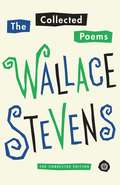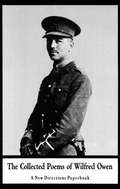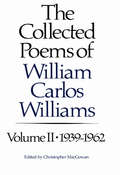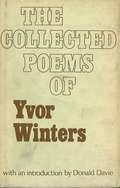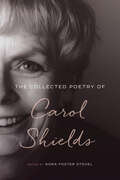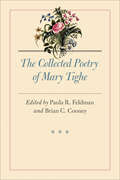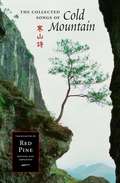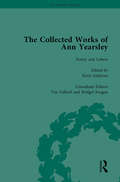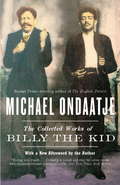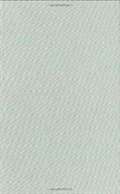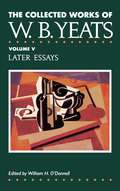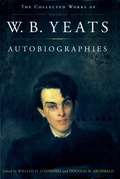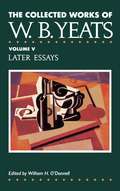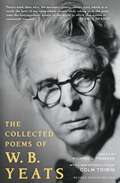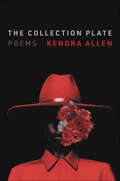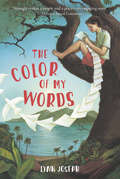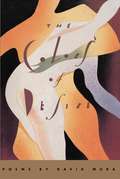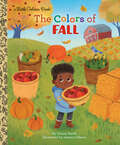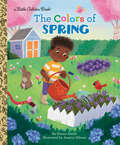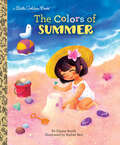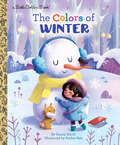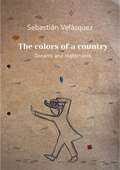- Table View
- List View
The Collected Poems of Wallace Stevens
by Wallace StevensThis definitive poetry collection, originally published in 1954 to honor Stevens on his 75th birthday, contains:<P><P> - "Harmonium"<P> - "Ideas of Order"<P> - "The Man With the Blue Guitar"<P> - "Parts of the World"<P> - "Transport Summer"<P> - "The Auroras of Autumn"<P> - "The Rock"<P> Winner of the National Book Award
The Collected Poems of Wallace Stevens
by Wallace StevensThis definitive poetry collection, originally published in 1954 to honor Stevens on his 75th birthday, contains:- "Harmonium"- "Ideas of Order"- "The Man With the Blue Guitar"- "Parts of the World"- "Transport Summer"- "The Auroras of Autumn"- "The Rock"
The Collected Poems of Wilfred Owen
by Wilfred Owen C. Day Lewis Edmund Blunden"The very content of Owen's poems was, and still is, pertinent to the feelings of young men facing death and the terrors of war." --The New York Times Book Review Wilfred Owen was twenty-two when he enlisted in the Artists' Rifle Corps during World War I. By the time Owen was killed at the age of 25 at the Battle of Sambre, he had written what are considered the most important British poems of WWI. This definitive edition is based on manuscripts of Owen's papers in the British Museum and other archives.
The Collected Poems of William Carlos Williams: 1909-1939
by William Carlos Williams Christopher MacGowanConsidered by many to be the most characteristically American of our twentieth-century poets, William Carlos Williams "wanted to write a poem / that you would understand / ,,,But you got to try hard—." So that readers could more fully understand the extent of Williams' radical simplicity, all of his published poetry, excluding Paterson, was reissued in two definite volumes, of which this is the first.
The Collected Poems of Williams Carlos Williams: 1939-1962 (Vol #2)
by William Carlos Williams Christopher MacgowanConsidered by many to be the most characteristically American of our twentieth-century poets, William Carlos Williams "wanted to write a poem / that you would understand / ,,,But you got to try hard--." So that readers could more fully understand the extent of Williams' radical simplicity, all of his published poetry, excluding Paterson, was reissued in two definite volumes, of which this is the first.
The Collected Poems of Yvor Winters
by Yvor WintersThe collected poems of Yvor Winters ; with an introduction by Donald Davie
The Collected Poetry of Carol Shields
by Carol ShieldsCarol Shields, best known for her fiction writing, received both the Pulitzer Prize and the Governor General’s Award for Fiction for her novel The Stone Diaries. But she also wrote hundreds of poems over the span of her career.The Collected Poetry of Carol Shields includes three previously published collections and over eighty unpublished poems, ranging from the early 1970s to Shields’s death in 2003. In a detailed introduction and commentary, Nora Foster Stovel contextualizes these poems against the background of Shields’s life and oeuvre and the traditions of twentieth-century poetry. She demonstrates how poetry influenced and informed Shields’s novels; many of the poems, which constitute miniature narratives, illuminate Shields’s fiction and serve as the testing ground for metaphors she later employed in her prose works. Stovel delineates Shields’s career-long interest in character and setting, gender and class, self and other, actuality and numinousness, as well as revealing her subversive feminism, which became explicit in Reta Winter’s angry (unsent) letters in Unless and in the stories of poet Mary Swann and Daisy Goodwill in Swann and The Stone Diaries.The first complete collection of her poetry, this volume is essential for all readers of Carol Shields. Stovel’s detailed annotations, based on research in the Carol Shields fonds at Library and Archives Canada, reveal the poems in all their depth and resonance, and the dignity and consequence they afford to ordinary people.
The Collected Poetry of Mary Tighe
by Paula R. Feldman and Brian C. CooneyThe most complete collection of Mary Tighe’s poetry published to date.Mary Blachford Tighe (1772–1810) was a crucial force in shaping British Romanticism. Her influential six-canto epic, Psyche, or the Legend of Love (1805), along with her shorter poems, engaged the central issues of the period, often in advance of writers now considered canonical. With remarkable vitality and virtuosity, Tighe wrote about the tensions between love and loss, duty and desire, the spiritual and the sensuous, nation and family, and the Irish and the British, all while struggling with the debilitating illness that eventually claimed her life. This scholarly edition collects for the first time dozens of recently discovered poems, accompanied by Tighe’s own illustrations, and identifies eight false attributions. A historical and biographical introduction from editors Paula R. Feldman and Brian C. Cooney discusses Tighe’s work within a larger social and political context, placing renewed emphasis on the conflicts she experienced as a Methodist with Anglo-Irish roots. Editorial annotations shed new light on Tighe’s life, revealing for the first time, for example, that her songs were performed during her lifetime on the Dublin stage.Meticulously edited, this volume builds on recent pioneering scholarship to restore and burnish Tighe’s reputation as a major Romantic-era poet.
The Collected Songs of Cold Mountain
by Cold MountainThis authoritative, bilingual edition represents the first time the entirety of Cold Mountain's poetry has been translated into English.These translations were originally published by Copper Canyon Press nearly twenty years ago. Now, significantly revised and expanded, the collection also includes a new preface by the translator, Red Pine, whose accompanying notes are at once scholarly, accessible, and entertaining. Also included for the first time are poems by two of Cold Mountain's colleagues.Legendary for his clarity, directness, and lack of pretension, the eight-century hermit-poet Cold Mountain (Han Shan) is a major figure in the history of Chinese literature and has been a profound influence on writers and readers worldwide. Writers such as Charles Frazier and Gary Snyder studied his poetry, and Jack Kerouac's Dharma Bums is dedicated "to Han Shan." 1.Bstoried cliffs were the fortune I castbird trails beyond human trackswhat surrounds my yardwhite clouds nesting dark rocksI've lived here quite a few yearsand always seen the spring-water changetell those people with tripods and bellsempty names are no damn good 71.someone sits in a mountain gorgecloud robe sunset tasselshandful of fragrances he'd sharethe road is long and hardregretful and doubtfulold and unaccomplishedthe crowd calls him crippledhe stands alone steadfast 205.my place is on Cold Mountainperched on a cliff beyond the circuit of afflictionimages leave no trace when they vanishI roam the whole galaxy from herelights and shadows flash across my mindnot one dharma comes before mesince I found the magic pearlI can go anywhere everywhere it's perfect Cold MountainA mountain man lives under thatchbefore his gate carts and horses are rarethe forest is quiet but partial to birdsthe streams are wide and home to fishwith his son he picks wild fruitwith his wife he hoes between rockswhat does he have at homea shelf full of nothing but books
The Collected Works of Ann Yearsley Vol 1
by Tim Fulford Bridget Keegan Kerri AndrewsPresents the works of Ann Yearsley, a laboring-class poet' whose writing forms part of an under-represented area of romanticism. This work includes her play "Earl Goodwin" and novel "The Royal Captives".
The Collected Works of Billy the Kid
by Michael OndaatjeDrawing on contemporary accounts, period photographs, dime novels, and his own prodigious fund of empathy and imagination, Michael Ondaatje's visionary novel traces the legendary outlaw's passage across the blasted landscape of 1880 New Mexico and the collective unconscious of his country. The Collected Works of Billy the Kid is a virtuoso synthesis of storytelling, history, and myth by a writer who brings us back to our familiar legends with a renewed sense of wonder.From the Trade Paperback edition.
The Collected Works of Ralph Waldo Emerson Volume I: Nature, Addresses, and Lectures
by Ralph Waldo Emerson Alfred R. Ferguson Robert E. Spiller Waldron P. BelknapRecords the creative and intellectual development of Emerson as a man of letters through a collection of his writings.
The Collected Works of W. B. Yeats Vol. V: Later Essays
by William Butler YeatsCompiling nineteen essays and introductions, a volume with explanatory notes includes Per Amica Silentia Lunae and On the Boiler as well as introductions on Shelley and Balzac and essays on Irish poetry and politics.
The Collected Works of W. B. Yeats Volume III: Autobiographies
by William Butler Yeats Douglas Archibald William O'DonnellAutobiographies consists of six autobiographical works that William Butler Yeats published together in the mid-1930s to form a single, extraordinary memoir of the first fifty-eight years of his life, from his earliest memories of childhood to winning the Nobel Prize for Literature. This volume provides a vivid series of personal accounts of a wide range of figures, and it describes Yeats's work as poet and playwright, as a founder of Dublin's famed Abbey Theatre, his involvement with Irish nationalism, and his fascination with occultism and visions. This book is most compelling as Yeats's own account of the growth of his poetic imagination. Yeats thought that a poet leads a life of allegory, and that his works are comments upon it. Autobiographies enacts his ruling belief in the connections and coherence between the life that he led and the works that he wrote. It is a vision of personal history as art, and so it is the one truly essential companion to his poems and plays. Edited by William H. O'Donnell and Douglas N. Archibald, this volume is available for the first time with invaluable explanatory notes and includes previously unpublished passages from candidly explicit first drafts.
The Collected Works of W. B. Yeats Volume III: Autobiographies
by William H. O'Donnell William Butler Yeats Douglas N. ArchibaldThe Collected Works of W. B. Yeats, Volume III: Autobiographies is part of the fourteen-volume series overseen by eminent Yeats scholars Richard J. Finnerah and George Mills Harper. The series includes virtually all of the Nobel laureate's published work, with authoritative and explanatory notes. Autobiographies consists of six autobiographical works --Reveries Over Childhood and Youth, The Trembling of the Veil, Dramatis Personae, Estrangement, The Death of Synge, and The Bounty of Sweden-- that William Butler Yeats published together in the mid-1930s to form a single, extraordinary memoir of the first fifty-eight years of his life, from his earliest memories of childhood to winning the Nobel Prize for Literature. This volume provides a vivid series of personal accounts of a wide range of figures, and it describes Yeats's work as poet and playwright, as a founder of Dublin's famed Abbey Theatre, his involvement with Irish nationalism, and his fascination with occultism and visions. This book is most compelling as Yeats's own account of the growth of his poetic imagination. Yeats thought that a poet leads a life of allegory, and that his works are comments upon it. Autobiographies enacts his ruling belief in the connections and coherence between the life that he led and the works that he wrote. It is a vision of personal history as art, and so it is the one truly essential companion to his poems and plays. Edited by William H. O'Donnell and Douglas N. Archibald, this volume is available for the first time with invaluable explanatory notes and includes previously unpublished passages from candidly explicit first drafts.
The Collected Works of W. B. Yeats Volume V: Later Essays
by William Butler YeatsCompiling nineteen essays and introductions, a volume with explanatory notes includes Per Amica Silentia Lunae and On the Boiler as well as introductions on Shelley and Balzac and essays on Irish poetry and politics.
The Collected Works of W.B. Yeats Volume I: Revised Second Edition
by William Butler YeatsBreathtaking in range, The Collected Poems of W. B. Yeats includes all of the poems authorized by Yeats for inclusion and encompasses the entire arc of his career: reworkings of ancient Irish myths and legends, meditations on youth and old age, whimsical songs of love, and somber poems of life in a nation torn by war and uprising.The Collected Poems of W. B. Yeats includes all of the poems authorized by Yeats for inclusion in his standard canon. Breathtaking in range, it encompasses the entire arc of his career, from luminous reworkings of ancient Irish myths and legends to passionate meditations on the demands and rewards of youth and old age, from exquisite, occasionally whimsical songs of love, nature, and art to somber and angry poems of life in a nation torn by war and uprising. In observing the development of rich and recurring images and themes over the course of his body of work, we can trace the quest of this century's greatest poet to unite intellect and artistry in a single magnificent vision. Revised and corrected, this edition includes Yeats's own notes on his poetry, complemented by explanatory notes from esteemed Yeats scholar Richard J. Finneran. The Collected Poems of W. B. Yeats is the most comprehensive edition of one of the world's most beloved poets available in paperback.
The Collection Plate: Poems
by Kendra AllenA deeply wrought and joyful debut poetry collection from an exciting new voice Looping exultantly through the overlapping experiences of girlhood, Blackness, sex, and personhood in America, award-winning essayist and poet Kendra Allen braids together personal narrative and cultural commentary, wrestling with the beauty and brutality to be found between mothers and daughters, young women and the world, Black bodies and white space, virginity and intrusion, prison and freedom, birth and death. Most of all, The Collection Plate explores both how we collect and erase the voices, lives, and innocence of underrepresented bodies—and behold their pleasure, pain, and possibilityBoth formally exciting and a delight to read, The Collection Plate is a testament to Allen’s place as the voice of a generation—and a witness to how we come into being in the twenty-first century.
The Color of My Words
by Lynn JosephAméricas Award Winner“An achingly beautiful story.”—Kirkus (starred review) “Eloquent.”—Booklist (starred review) “Lovely and lyrical.”—School Library JournalThis powerful and resonant Américas Award-winning novel tells the story of a young girl’s struggle to find her place in the world and to become a writer in a country where words are feared.Seamlessly interweaving both poetry and prose, Lynn Joseph’s acclaimed debut is a lush and lyrical journey into a landscape and culture of the Dominican Republic.The Color of My Words explores the pain and poetry of discovering what it means to be part of a family, what it takes to find your voice and the means for it to be heard, and how it feels to write it all down.
The Colors of Desire: Poems
by David MuraA collection of poems by the author of Turning Japanese, exploring race and sexuality, history and identity, through the lens of desire.
The Colors of Fall (Little Golden Book)
by Danna SmithThis rhyming Little Golden Book celebrates all the bright and beautiful colors of the fall season!YELLOW are the leavesfalling to the ground.GRAY is the tractorthat makes a rumbling sound. . . .Preschoolers will enjoy this lively poem about all the festive colors of fall as they look at the beautiful illustrations showing a young boy enjoying the day at a pumpkin patch and petting farm. From red apples to gold hay bales to a white pony, there's so much to explore! It's a perfect companion to The Colors of Summer and The Colors of Winter.
The Colors of Spring (Little Golden Book)
by Danna SmithThis rhyming Little Golden Book celebrates all the blooming, bright, and beautiful colors of the spring season!ORANGE is the door of Grandpa's garden shed.BROWN is the soil that fills the flower bed. . . .Preschoolers will enjoy hearing the rhyming tale of a young boy and his grandfather gardening on a lovely spring day. The beautiful illustrations highlight the different colors to be seen including green weeds, purple flowers, yellow butterflies, and pink lemonade! It's the perfect companion to the Little Golden Books The Colors of Winter, The Colors of Summer, and The Colors of Fall.
The Colors of Summer (Little Golden Book)
by Danna SmithCelebrate the colors of summer with Little Golden Books!TURQUOISE is the beach towel--room enough for three. PURPLE are my flip-flops.No more shoes for me! Spend a fun-filled summer day at the beach and discover the bright colors all around. Kids will love finding their favorites, from purple flip-flops and orange sand shovels to green towels and blue waves. This bright summer read will have little ones eager to visit this colorful beach time and time again.
The Colors of Winter (Little Golden Book)
by Danna SmithThis Little Golden Book celebrates all the bright and beautiful colors of winter!WHITE is out the window. Look at all the snow!RED is Grandma's old sled. Up the hill we go. . . .Preschoolers will enjoy this lively poem about all the festive colors of winter. They'll gaze at the cheerful, textured illustrations of a girl playing outside on a snowy day until it's time to warm up inside--over hot cocoa with Grandma. "TURQUOISE is the handle of my favorite cup. BROWN is hot cocoa that warms my insides up. . . ." This story, by one of today's acclaimed picture-book authors, has the feel of a cherished classic. A perfect companion to The Colors of Summer!
The Colors of a Country: Dreams and Nightmares
by Sebastián Velásquez"The Colors of a Country" is a book of poems that shows off the enormous beauty of Colombia, but also its great contradictions, like violence and armed conflict. With this book I am trying to bring awareness to the reader about our true riches and the absurdity of war. It is a short book written from the heart and it is an invitation to heal old wounds and to see our regions and our people from a different perspective.
